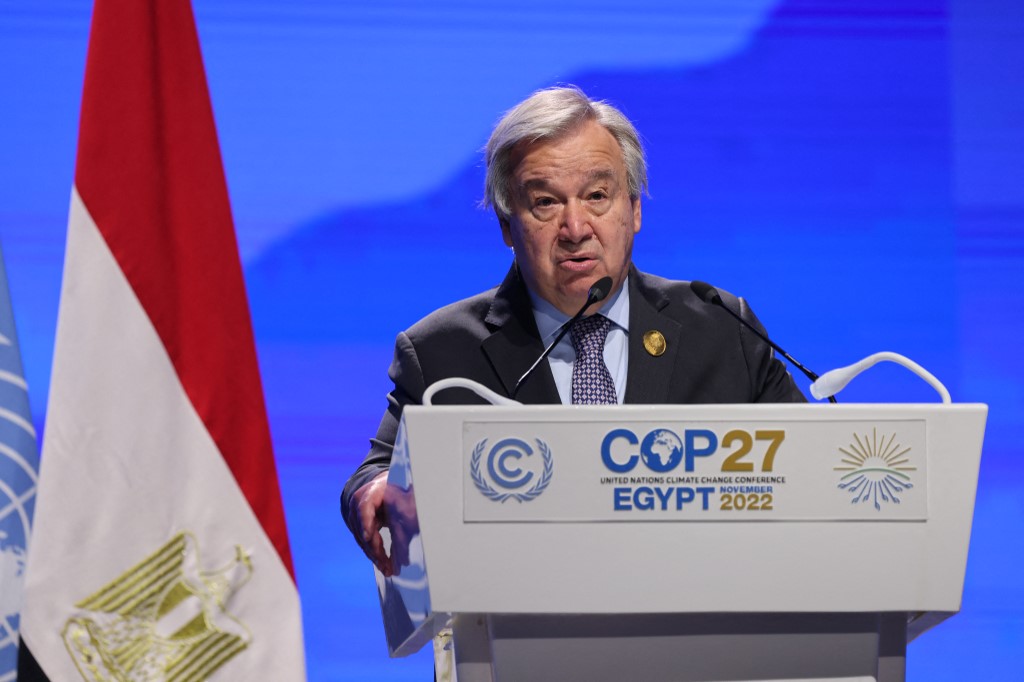How US militarism is fuelling the climate crisis

Earlier this week, world leaders, activists, and civil society representatives began a marathon summit in the Egyptian resort city of Sharm El-Sheikh to discuss ways and means to save the planet.
But with tens of thousands of Egyptians, including the brilliant writer Alaa Abd el-Fattah, held as political prisoners in Egypt since 2013, the human rights record of the host nation has inevitably stolen the limelight.
The UN Climate Change Conference, or Cop27, was doomed from the start.
The Egyptian government is known for stifling dissent, arresting and torturing activists, harassing and surveilling environmental groups, censoring news and information, and outlawing street protests. It is a cesspool of crony capitalism, dictatorship and rights violations.
Stay informed with MEE's newsletters
Sign up to get the latest alerts, insights and analysis, starting with Turkey Unpacked
But while Egypt is no preserve of human dignity and should never have been awarded the opportunity to host Cop27, it is also just the face of the farce.
'Highway to climate hell'
In his opening address at Cop27, UN Secretary General Antonio Guterres described the planet as "fast approaching tipping points that will make climate chaos irreversible".
"We are on a highway to climate hell with our foot on the accelerator," Guterres told heads of state from nations around the world. Amid raging conflicts around the globe, the issue of climate change cannot be sidelined, he added: "Many of today's conflicts are linked with growing climate chaos."
But there was a glaring omission in Guterres's speech. While he urged countries in the Global North to make good on funding to help low-income nations mitigate and adapt to the climate emergency, he made no mention of the oversized contribution of the world's militaries, in particular the US military, to climate change - nor did he encourage the world's militaries to scale back on their carbon emissions.
It is estimated that the world's armed forces account for around five percent of the world's carbon emissions every year. The US military, with close to 800 bases in 80 countries, is the chief perpetrator.
Experts say the US military consumes more energy than any other institution in the world and is responsible for more greenhouse gases than 130 other countries, including Switzerland and Norway.
"The United States military is the number one polluter in the world; it is the largest single institutional source of emissions in the world," Lara Kiswani, executive director of the Arab Resource and Organizing Center in San Francisco, told Middle East Eye.
"And yet, where are the discussions about holding them accountable or in any way curbing the US military's activities in order to lessen the impacts of climate change? Well, we know that an economy based on the exploitation of human labour and the extraction of wealth can only be maintained through systematic and well-organised violence: militarism."
A UN spokesperson told MEE that there were two side events focused on the impacts of the military. Kiswani, whose colleague will be participating in one of these events, said given that wars are typically fought over resources, "conversations on climate justice must also include a conversation about transforming the economy, to a shift away from an extractive one and towards a regenerative one".
Protecting access to oil
In her new book, The Pentagon, Climate Change, and War: Charting the Rise and Fall of U.S. Military Emissions, Neta C Crawford argues that although the US military has reduced emissions over the past 20 years, it hasn't been nearly enough.
"There is, in other words, a lack of a sense of urgency and agency that is astounding for an institution that believes it can do almost anything," writes Crawford, who is also the co-director of Brown University's Costs of War Project. "Nor does it appear that decision makers within the Department of Defense believe that significant reductions in Pentagon fuel use, or indeed overall U.S. petroleum consumption, are a potentially significant way to reduce the risks of climate change-caused operational vulnerabilities and national security risks."
Crawford's book, an extraordinary synthesis of research and documentation of the US military's reliance on energy and the extent of its carbon footprint, examines how the American empire became dependent on fossil fuels and directed a sizeable chunk of its foreign policy towards protecting access to them.
'We cannot separate the ecological catastrophe of militarism from US imperialism, or from its global partnerships'
- Lara Kiswani, executive director of the Arab Resource and Organizing Center
The Gulf War in the early 1990s, or Washington's longstanding dogged efforts to support and protect an authoritarian state such as Saudi Arabia, are a testament to this obsession with oil.
When it comes to the climate, the US has disregarded international consensus for decades. In 1997, the Kyoto Protocol committed industrialised countries to binding cuts in greenhouse-gas emissions, with a key exemption: pressure from the US ensured that military activities were not part of emissions targets. Still, the US refused to ratify the protocol, further exemplifying its commitment to maintaining military dominance and its industrial base over concern for the planet.
In the lead-up to the 2003 invasion of Iraq, and even as the US Department of Defense published a report on the impacts of climate change on national security, the George W Bush government was still insinuating that human-caused climate change wasn't real.
As late as 2007, then-Vice President Dick Cheney expressed doubts about a report that called for urgent action. Rolling Stone magazine described the White House as having "implemented an industry-formulated disinformation campaign designed to actively mislead the American public on global warming and to forestall limits on climate polluters".
These acts of subterfuge were followed periodically by attemps to undermine international efforts to reduce further damage to the environment. Even the much-vaunted Paris Agreement, which took effect in 2016, did little to hold militaries to account for their role in carbon emissions; it merely made reporting military emissions voluntary.
"We cannot separate the ecological catastrophe of militarism from US imperialism, or from its global partnerships, whether that be the brutal Egyptian regime or apartheid Israel," Kiswani said. "And all while we watch as these regimes target and imprison activists like Alaa, the freedom fighters in Palestine, or water protectors here in the US, what is at stake for us all is the future of the living world they are fighting for."
Ambivalent policies
Advocates have repeatedly argued that climate justice is inextricably linked with economic and social justice.
Yet, the same US military that breathes life into Egyptian President Abdel Fattah al-Sisi's military dictatorship, signing off on the past decade of injustice in Egypt - including the arrests of climate advocates - is almost never questioned for its own role in the environmental malaise.
Its advanced research into the impacts of climate change notwithstanding, the military has not, until quite recently, acknowledge its outsized role in greenhouse-gas emissions, Crawford writes. The US military has thus not merely contributed to the crisis; it has long been shielded from acknowledging its role in fuelling it.
Instead, as circumstances have become dire and the US military has seen extreme weather events impact the efficacy of military installations around the world, the US army has looked to "adapt" to the impacts of climate change, framing its move away from fossil fuels as a question of "efficiency".
According to Crawford, the distinction matters because the emphasis is less on reducing carbon emissions. And whereas the Department of Defense has acknowledged there is an issue, "the federal government's policies appear to be ambivalent if not contradictory regarding whether it treats climate change as an existential threat".
In other words, the military still prioritises "national security" above all else.
The disastrous Russian invasion of Ukraine that began earlier this year, and the US government's refusal to explore diplomatic solutions to a crisis that has both deflected attention from climate change and led the world to the brink of nuclear disaster, appears to testify to this.
At a time of worldwide strife - when millions of people from Puerto Rico and Cuba, to Pakistan and across Europe, are struggling with extreme weather conditions - holding Cop27 in a state with no interest in maintaining even a facade of dignity and decency for the self-determination of ordinary people, is an embarrassment in and of itself.
But to forget that Egypt is only one part of the American empire's vast tentacles in the Middle East, as it keeps its eye on the fossil fuels in the Gulf, is to conveniently forget who is complicit, or who is often directing policy.
The views expressed in this article belong to the author and do not necessarily reflect the editorial policy of Middle East Eye.
Middle East Eye delivers independent and unrivalled coverage and analysis of the Middle East, North Africa and beyond. To learn more about republishing this content and the associated fees, please fill out this form. More about MEE can be found here.


.png?itok=lFXpj-Gr)




